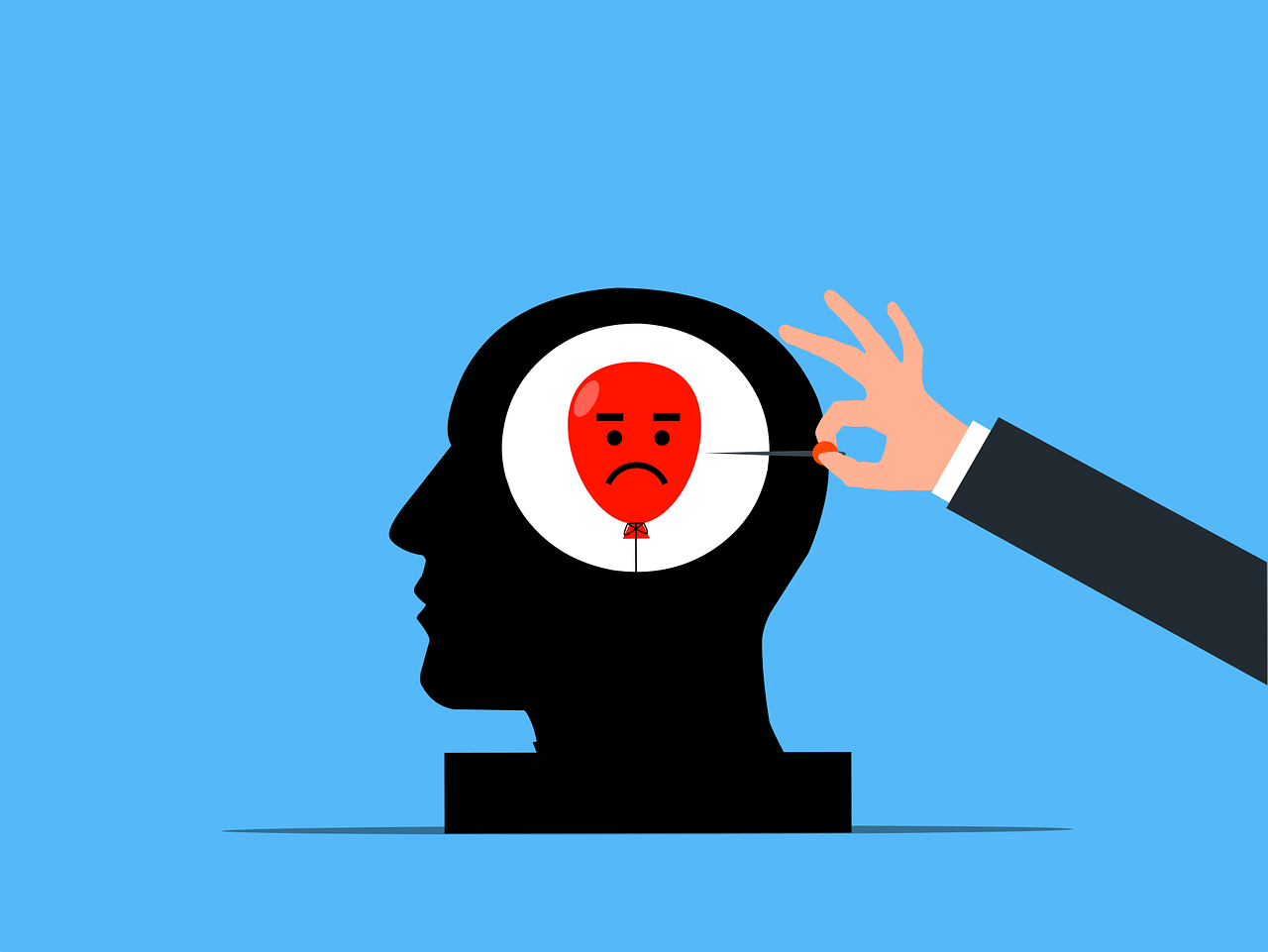How To Deal With Negative Thoughts

First, what do I mean when talking about negative thoughts?
In my opinion, thoughts are negative when they trigger negative emotions like hate, anger, hopelessness, fear and so on. I would also add that a negative thought is not necessarily a bad thought. It’s perfectly normal to have negative thoughts and feelings. Those can even be helpful. From my point of view, it shouldn’t be the goal to feel ecstatic and positive all the time. That being said, I think everybody has negative thoughts that are not helpful. Thoughts or thinking patterns that prevent us from taking the steps we want to take. We should have a strategy in place to deal with those thoughts effectively.
Why do we have negative thoughts anyway?
Most of us will probably think more negative than positive thoughts throughout our day. But why is that? One reason could be the evolutionary history of our brains. Since the beginning of mankind, our brain’s main purpose was to keep us alive and protect us from dangers. To do this effectively, our mind naturally places a greater focus on the negative aspects (potential threats) in our environment. This tendency has been very helpful back in the day. Today however it seems like negative thinking patterns are getting more excessive which causes a lot of problems for our emotional well-being.
Now how do we deal with all these negative thoughts?
First of all, it is important to understand that we have very little control over our thoughts. Let me give you an example: When I tell you not to think about a big pink elephant you will probably think about just that. You did not decide to think about the elephant it just happened automatically. Similarly, we are constantly thinking about our wishes, attitudes and goals. The thoughts just pop into our minds without us choosing them directly. Most of these thoughts probably have some negative aspects to them.
So we can’t do much against the appearance of negative thoughts in our mind but we can change our reaction to them. In the following, I will show you a strategy I learned that should improve your ability to deal with upcoming negative thoughts.
Arguing with yourself

Our thoughts can often be gross misinterpretations of reality or baseless negative statements about ourselves. So we shouldn’t always take them at face value. Would someone talk to us like our thoughts sometimes do, we would most likely protest and debunk the statements. We don’t have to accept the content of our thoughts as facts about ourselves and the world. There is a strategic approach to challenging your own thoughts. When our brain comes up with a baseless accusation, we will be able to argue against it.
To do this, let me explain to you the ABCDE method by Albert Ellis. This method is very helpful when dealing with pessimistic, unhelpful or self-destructive thoughts. The letters ABCDE stand for Adversity, Belief, Consequences, Disputation and Energization. They describe a process for effectively arguing against yourself. Let’s start with a short description of these words:
- Adversity: An event that triggers a negative thought
- Beliefs: Thoughts and judgments following the adversity
- Consequences: Emotional reactions triggered by the beliefs
- Disputation: Forming counter-arguments to one’s own beliefs
- Energization: More energy and improved mood after successfully disproving a thought
Let’s look at the ABCDE method with an example. Imagine a university student in his third semester. He faces a common problem among students and uses the ABCDE method. Let’s go through his thought process.
- Adversity: I have to prepare a term paper for my university. I haven’t started yet and the deadline is getting closer and closer. I know my professor has high standards and the paper will take a lot of effort to prepare. I don’t know if I will make it in time.
- Believe: Because I have been procrastinating for some time now, I start to believe that I might fail this paper altogether. If I can’t pass this assignment maybe I can’t pass other assignments in the future. Also I have heard that procrastination might indicate that you chose the wrong field of study. Maybe I should just quit and switch fields?
- Consequences: I start feeling stressed. I can’t concentrate. I feel pressure and fear when thinking about my future.
- Disputation: I tell myself that procrastination is perfectly normal and something that everybody experiences. After all, I don’t know anybody who likes preparing term papers. Additionally, I have been in situations like this before. I worked on projects with tight deadlines and it always worked out in the end. It also helps you to keep the focus on the things which are most important. I will be able to handle this.
Also just because I have been procrastinating about this term paper doesn’t mean I am in the wrong field of study. I remind myself of all the other courses I have which I really like. - Energization: I feel relieved. The pressure is reduced and I start relaxing again. I even start to research a little for my paper.
The first step when using the ABCDE method is of course the realization that you are currently having an unhelpful negative thought. The next step is to successfully dispute yourself as shown above. There are broadly speaking 4 methods you can use to disprove unhelpful or negative thoughts and make a successful disputation happen.
- Evidence technique: Our reactions to adversities are often exaggerated. If we look at what really happened, our thoughts are usually easy to disprove. The goal here is to use reality as proof against our overdramatization. Exp.: Based on the situation above, I would think about all the times I was on a tight deadline and still got a good grade.
- Alternatives technique: There are often many reasons for something not going as planned. Some of us tend to see ourselves as the only reason why something failed. But the reality is far more complex. Instead of seeing only our own fault, we should try to find external reasons for why something went wrong. Exp.: The reason why I started so late with my assignment was not only my lack of motivation. I also had some family events, which took up a lot of my time. Additionally, I had other university projects to prepare. So it’s not just my fault that I started late.
- Implications technique: Sometimes, reality is not on our side. Sometimes, we really are at fault for messing something up. In this case, it is important to dedramatize the situation. Try to see your situation in a more realistic light. How likely is the worst-case-horror scenario really? Then, as you did with the evidence technique, look for proof that helps dedramatize your situation. You can even look for positive aspects or advantages in your new situation. Exp.: Let’s say I fail my term paper. What are the chances that a failed paper in the third semester will affect my future employment? Also, I can try it again next semester. I will be much better prepared and able to better manage my time as a result.
- Usefulness technique: Even if our pessimistic thoughts are true, it is not useful to hold on to them. The world may be unfair and cruel but giving in to self-pity won’t change that. It makes more sense to focus on how you might be able to change the situation. Exp.: Yes, I started way too late with the assignment and will, quite certainly, not be able to achieve the grade I wanted. Nevertheless, I can spend as much of my remaining time as possible in the library and focus on the most important parts of the paper. This way I may still get a decent result.
When noticing a negative thought you can immediately try to make use of those four techniques and disprove it. The whole ABCDE method can be practiced on a regular basis. Take a troublesome thought, which comes up often, and go through the five stages on a sheet of paper. This method can become a habit and strongly improve your reaction to adversity.
Meditation

You cannot change your reaction towards your negative thoughts when you don’t realize that you are having them. Meditation and especially mindfulness meditation is the perfect cure if you want to be more aware of the thoughts going through your head on a daily basis. The goal of mindfulness meditation is to fall back and just watch thoughts and feelings appear and disappear in consciousness. It helps you realize more quickly when you are going down a negative thought spiral. Besides gaining a better understanding of our mind, meditation has a lot of other proven benefits. Meditation reduces stress, negative emotions and improves our cognitive abilities and social relationships. Currently, you have more options than ever to learn meditation. Streaming platforms like Spotify, Netflix and Amazon Prime for example have meditation courses included in their program which makes it easy to start.
Realizing you are having an unhelpful, pessimistic or self-destructive thought is a great first step. The next step would be to disprove them by trying to look at your situation in a more realistic and compassionate light. Also instead of dwelling on existing problems, it can be very helpful to focus on possible solutions. Implementing these steps as a new thinking pattern can make you more resilient to negative life events and also increases your well-being. By practicing these steps you will most likely become less defensive and anxious and develop a more hopeful and forgiving attitude.
I hope you learned something useful from this post. 😊